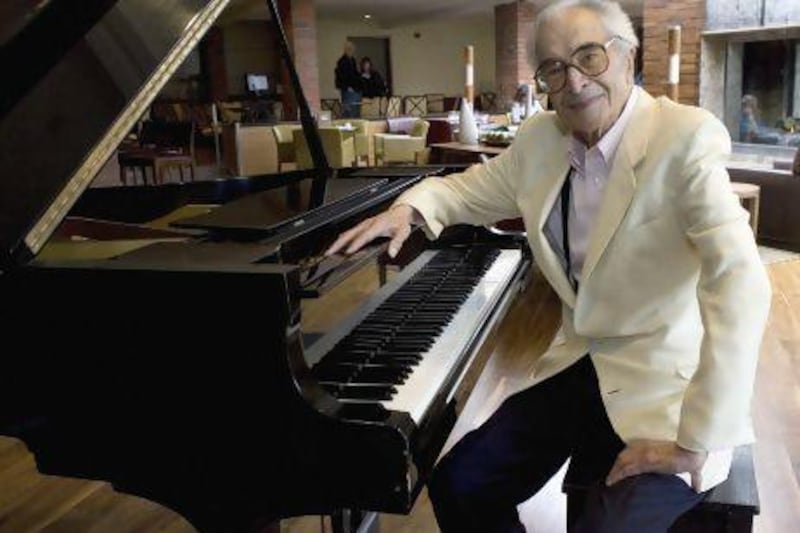You don't have to be a jazz aficionado to recognize Take Five, the smoky instrumental by the Dave Brubeck Quartet that instantly evokes swinging bachelor pads, hi-fi systems and cool nightclubs of the 1950s and '60s.
Take Five was a musical milestone - a deceptively complex jazz composition that managed to crack the Billboard singles chart and introduce a new, adventurous sound to millions of listeners.
In a career that spanned almost all of American jazz since the Second World War, Brubeck's celebrated quartet combined exotic, challenging tempos with classical influences to create lasting standards.
The pianist and composer behind the group, Brubeck died on Wednesday of heart failure at a hospital in the US state of Connecticut. He was a day shy of his 92nd birthday.
Brubeck believed that jazz presented the best face of America to the world.
"Jazz is about freedom within discipline," he said in a 2005 interview. "Usually a dictatorship like in Russia and Germany will prevent jazz from being played because it just seemed to represent freedom, democracy and the United States.
"Many people don't understand how disciplined you have to be to play jazz. ... And that is really the idea of democracy - freedom within the Constitution or discipline. You don't just get out there and do anything you want."
The common thread that ran through Brubeck's work was breaking down the barriers between musical genres - particularly jazz and classical music. He was inspired by his mother, a classical pianist, and later by his composition teacher, the French composer Darius Milhaud, who encouraged his interest in jazz and advised him to "keep your ears open" as he travelled the world.
"When you hear Bach or Mozart, you hear perfection," Brubeck said in 2005. "Remember that Bach, Mozart and Beethoven were great improvisers. I can hear that in their music."
Brubeck was always fascinated by the rhythms of everyday life. In a discussion with biographer Doug Ramsey, he recalled the rhythms he heard while working as a boy on cattle drives at the northern California ranch managed by his father.
The first time he heard polyrhythms - the use of two rhythms at the same time - was on horseback.
"The gait was usually a fast walk, maybe a trot," he said. "And I would sing against that constant gait of the horse. ... There was nothing to do but think, and I'd improvise melodies and rhythms."
Brubeck combined classical influences and his own innovations on the seminal 1959 album Time Out by his classic quartet that included the alto saxophonist Paul Desmond, the drummer Joe Morello and the bassist Eugene Wright.
It was the first jazz album to deliberately explore time signatures outside of the standard 4/4 beat or 3/4 waltz time. It was also the first million-selling jazz LP and is still among the best-selling jazz albums of all time.
Columbia executives blocked its release for nearly a year - until the label president, Goddard Lieberson, intervened.
"They said, 'We never put out music that people can't dance to, and they can't dance to these rhythms that you're playing,'" Brubeck recalled in 2010. He also wanted a painting by Joan Miro on the cover, something else the record company had never done.
"I insisted that we go with something new," he said. "And to their surprise, it became the biggest jazz recording they ever made."
The album opens with Blue Rondo a la Turk, a piece inspired by Turkish street musicians Brubeck heard on a 1958 State Department tour.
The album also featured Take Five, the cool and catchy odd-metered tune that became the Brubeck quartet's theme. The tune was derived from a pattern that Morello liked to play backstage.
"It was a song that people could relate to, and it influenced the future of the music," said George Wein, a jazz pianist and founder of the Newport Jazz Festival.
Brubeck "proved that a song with five beats in it and one with nine beats in it could become popular," the pianist Herbie Hancock said.
Brubeck always felt that his successful jazz career led fans to overlook the second career he launched as a jazz-inspired classical orchestral and choral composer in 1967 after disbanding his original quartet.
His experience in the Second World War led him to look beyond jazz to compose oratorios, cantatas and other extended works touching on themes involving religion, civil rights and peace.
"I knew I wanted to write on religious themes when I was a GI in World War II," Brubeck said, recalling how he was trapped behind German lines in the Battle of the Bulge and nearly killed. "I saw and experienced so much violence that I thought I could express my outrage best with music."
Brubeck joined the army as an infantry man, but ended up leading the semi-official Wolf Pack band attached to General George S Patton's army.
His band, which was one of the first integrated units in the then-segregated army, reopened the Opera House in Nuremberg, the site of mass rallies organised by the Nazis, who had banned jazz.
Years later, the addition of Wright to Brubeck's quartet made the group one of the nation's best-known integrated music acts. A longtime champion of civil rights, Brubeck cancelled lucrative gigs at universities in the US South and on television's Bell Telephone Hour when the organizers insisted that he replace Wright. He refused to play in South Africa under apartheid.
In a 2010 interview, Brubeck envisioned an afterlife where he'd again see his family and jazz friends, including Louis Armstrong, Duke Ellington and Count Basie.
"If there's a heaven," Brubeck said, "let it be a good place for all of us to jam together and have a wonderful, wonderful musical experience."
Brubeck is survived by his wife of 70 years, a daughter and four musician sons. Another son died in 2009.






